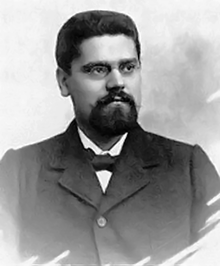
Fascism is a far-right, authoritarian, ultranationalist political ideology and movement, characterized by a dictatorial leader, centralized autocracy, militarism, forcible suppression of opposition, belief in a natural social hierarchy, subordination of individual interests for the perceived good of the nation or race, and strong regimentation of society and the economy.

Benedetto Croce, KOCI, COSML was an Italian idealist philosopher, historian, and politician who wrote on numerous topics, including philosophy, history, historiography, and aesthetics. A political liberal in most regards, he formulated a distinction between liberalism and "liberism". Croce had considerable influence on other Italian intellectuals, from Marxists to Italian fascists, such as Antonio Gramsci and Giovanni Gentile, respectively.

Giovanni Gentile was an Italian philosopher, educator, and politician. Described by himself and by Benito Mussolini as the "philosopher of fascism", he was influential in providing an intellectual foundation for Italian fascism, and ghostwrote part of "The Doctrine of Fascism" (1932) with Mussolini. He was involved in the resurgence of Hegelian idealism in Italian philosophy and also devised his own system of thought, which he called "actual idealism" or "actualism", which has been described as "the subjective extreme of the idealist tradition".

The Enciclopedia Italiana di Scienze, Lettere e Arti, best known as Treccani for its developer Giovanni Treccani and also as Enciclopedia Italiana, is an Italian-language encyclopaedia, regarded as one of the great encyclopedias, being international in scope, alongside the Encyclopædia Britannica and others.
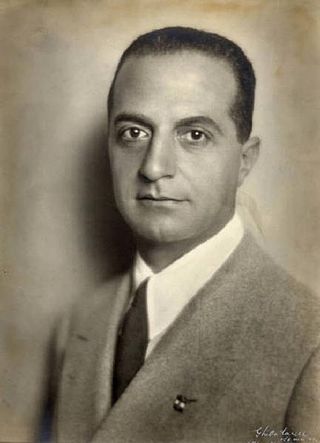
Giuseppe Bottai was an Italian journalist and member of the National Fascist Party of Benito Mussolini.
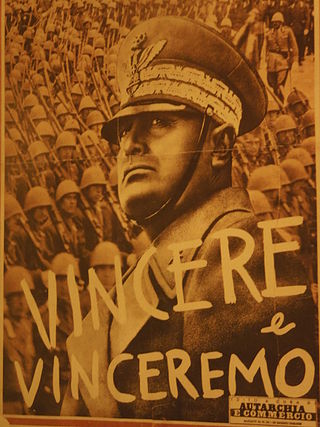
The history of fascist ideology is long and it draws on many sources. Fascists took inspiration from sources as ancient as the Spartans for their focus on racial purity and their emphasis on rule by an elite minority. Fascism has also been connected to the ideals of Plato, though there are key differences between the two. Fascism styled itself as the ideological successor to Rome, particularly the Roman Empire. From the same era, Georg Wilhelm Friedrich Hegel's view on the absolute authority of the state also strongly influenced fascist thinking. The French Revolution was a major influence insofar as the Nazis saw themselves as fighting back against many of the ideas which it brought to prominence, especially liberalism, liberal democracy and racial equality, whereas on the other hand, fascism drew heavily on the revolutionary ideal of nationalism. The prejudice of a "high and noble" Aryan culture as opposed to a "parasitic" Semitic culture was core to Nazi racial views, while other early forms of fascism concerned themselves with non-racialized conceptions of the nation.

The Grand Council of Fascism was the main body of Mussolini's Fascist regime in Italy, that held and applied great power to control the institutions of government. It was created as a body of the National Fascist Party in 1922, and became a state body on 9 December 1928. The council usually met at the Palazzo Venezia, Rome, which was also the seat of the head of the Italian government. The Council became extinct following a series of events in 1943, in which Benito Mussolini was voted out as the Prime Minister of Italy.
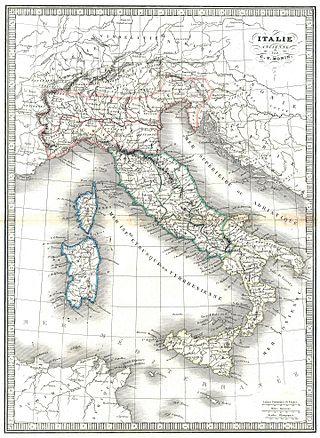
Italian fascism, also known as classical fascism or simply fascism, is the original fascist ideology as developed in Italy by Giovanni Gentile and Benito Mussolini. The ideology is associated with a series of two political parties led by Benito Mussolini: the National Fascist Party (PNF), which ruled the Kingdom of Italy from 1922 until 1943, and the Republican Fascist Party (PFR) that ruled the Italian Social Republic from 1943 to 1945. Italian fascism is also associated with the post-war Italian Social Movement (MSI) and subsequent Italian neo-fascist movements.

The Fasci Italiani di Combattimento was an Italian fascist organisation created by Benito Mussolini in 1919. It was the successor of the Fascio d'Azione Rivoluzionaria, being notably further right than its predecessor. The Fasci Italiani di Combattimento was reorganised into the National Fascist Party in 1921.
What constitutes as a definition of fascism and fascist governments has been a complicated and highly disputed subject concerning the exact nature of fascism and its core tenets debated amongst historians, political scientists, and other scholars ever since Benito Mussolini first used the term in 1915. Historian Ian Kershaw once wrote that "trying to define 'fascism' is like trying to nail jelly to the wall".
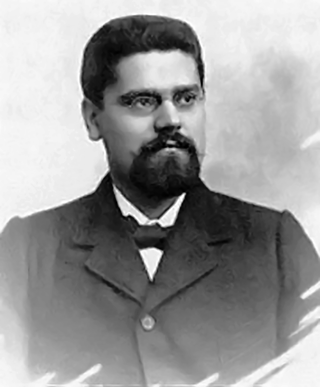
The "Manifesto of Fascist Intellectuals", by the actualist philosopher Giovanni Gentile in 1925, formally established the political and ideologic foundations of Italian Fascism. It justifies the political violence of the Blackshirt paramilitaries of the National Fascist Party, in the revolutionary realisation of Italian Fascism as the authoritarian and totalitarian rėgime of Prime Minister Benito Mussolini, who ruled Italy as Il Duce, from 1922 to 1943.
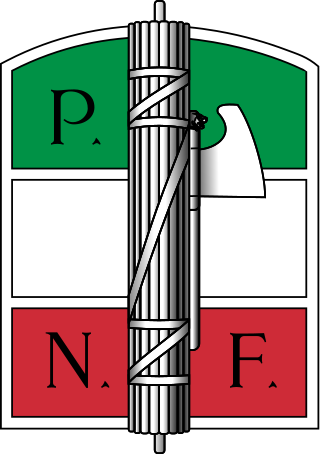
The National Fascist Party was a political party in Italy, created by Benito Mussolini as the political expression of Italian fascism and as a reorganisation of the previous Italian Fasces of Combat. The party ruled the Kingdom of Italy from 1922 when Fascists took power with the March on Rome until the fall of the Fascist regime in 1943, when Mussolini was deposed by the Grand Council of Fascism. It was succeeded, in the territories under the control of the Italian Social Republic, by the Republican Fascist Party, ultimately dissolved at the end of World War II.

Giovanni Preziosi was an Italian fascist politician noted for his contributions to Fascist Italy.
The Sandro Italico Mussolini School of Fascist Mysticism was established in Milan, Italy in 1930 by Niccolò Giani. Its primary goal was to train the future leaders of Italy's National Fascist Party. The school curriculum promoted Fascist mysticism based on the philosophy of Fideism, the belief that faith and reason were incompatible; Fascist mythology was to be accepted as a "metareality". In 1932, Mussolini described Fascism as "a religious concept of life", saying that Fascists formed a "spiritual community".
Fascist mysticism was a current of political and religious thought in Fascist Italy, based on Fideism, a belief that faith existed without reason, and that Fascism should be based on a mythology and spiritual mysticism. A School of Fascist Mysticism was founded in Milan on April 10, 1930, and active until 1943, and its main objective was the training of future Fascist leaders, indoctrinated in the study of various Fascist intellectuals who tried to abandon the purely political to create a spiritual understanding of Fascism. Fascist mysticism in Italy developed through the work of Niccolò Giani with the decisive support of Arnaldo Mussolini.

The Kingdom of Italy was governed by the National Fascist Party from 1922 to 1943 with Benito Mussolini as prime minister and dictator. The Italian Fascists imposed totalitarian rule and crushed political and intellectual opposition, while promoting economic modernization, traditional social values and a rapprochement with the Roman Catholic Church.

Friendly Fascism: The New Face of Power in America is a book written by Bertram Gross, American social scientist and professor of political science at Hunter College. The book was published on June 1, 1980, by M. Evans & Company as a 419-page hardback book containing 440 quotations and sources. It examines the history of fascism and, based on the growth of big business and big government, describes possible political scenarios for a future United States. According to a 1981 review in the journal Crime and Social Justice, the book is described as "timely" on a subject requiring serious consideration. It is about the dangers of fascism, focusing primarily on the United States, but being aware that monopoly capitalism needs to be understood internationally since capitalism "is not a national mode of production".
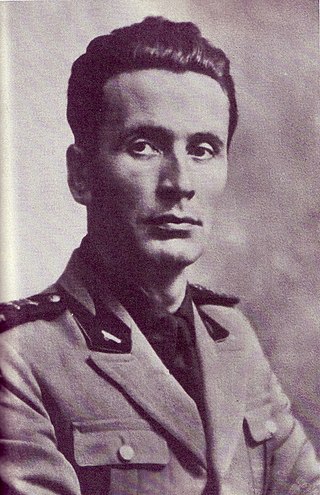
Niccolò Giani was an Italian Fascist philosopher and journalist who was the founder of Fascist mysticism.
Beniamino De Ritis was an Italian-born journalist-commentator and author.
The proprietary corporation is a concept proposed during Italian fascism by fascist political philosopher Ugo Spirito, in which a corporation, akin to a guild, assumes ownership of a company in which its members operate. This was proposed as a class-collaborative means to end the dualism between capital and labor via the transfer of the means of production to the corporation.
